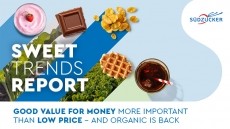EFSA upholds rejection of Nestlé’s beta-glucan health claim for cereals

The Swiss food giant had wanted to claim that its oat and barley beta-glucan-fortified breakfast cereals – namely its Fitness, Cheerios and Cocoa Puffs sold by the Cereal Partners Worldwide joint venture in the EU – could reduce blood glucose rise. Its exact claim would read: “Consumption of beta-glucans from oats and/or barley in a ready-to-eat breakfast cereal contributes to a reduction of the blood glucose rise after that meal.”
The effect of beta-glucans in reducing post-prandial blood glucose responses is well established. In 2011, EFSA approved similar claims relating to evidence that barley beta-glucans have been shown to lower/reduce blood cholesterol.
Then, it wrote that the following wording reflected the scientific evidence: “Barley beta-glucans have been shown to lower/reduce blood cholesterol. High cholesterol is a risk factor in the development of coronary heart disease.” In order to obtain the claimed effect, it added, 4 g of beta-glucans from oats or barley for each 30 g of available carbohydrate should be consumed per meal.
Nestlé’s application was both food specific (ready‐to‐eat breakfast cereals made by pressure cooking) and based on a lower dosage: 1.3 g beta‐glucans per 25 g of available carbohydrate.
It argued that the extrusion and batch cooking process could boost the blood glucose regulation potential of beta-glucans, writing “beta-glucans incorporated into cereals processed using pressure cooking would exert a higher effect on post-prandial glucose responses than beta-glucans added to other carbohydrate containing foods”. It claimed that "ready-to-eat cereals that are manufactured via pressurised batch cooking or extrusion, and containing oat or barley beta-glucans, are associated with increased beta-glucan extractability and increased viscosity, both of which are postulated to have a Beta-glucans from oats and/or barley and reduction of blood glucose rise after consumption".
Last year, however, the opinion of the EFSA's Panel on Nutrition, Novel Foods and Food Allergens (NDA) on Nestlé’s proposal was negative. After a request from the from the European Commission, EFSA was asked to review its findings. It has now again concluded the evidence provided is “insufficient to establish an effect on reduction of post‐prandial glycaemic responses at doses of 1.3 g beta‐glucans per 25 g of available carbohydrate incorporated into ready‐to‐eat breakfast cereals manufactured by pressure cooking (i.e. either batch cooking or extrusion), as requested by the applicant”.
A Nestlé spokesperson told FoodNavigator: “While we regret EFSA’s response to our findings on the health benefits of beta-glucans in breakfast cereals, we appreciate the positive feedback whereby EFSA confirmed the validity of the findings of one of our clinical studies and the opportunity to provide scientific comments. In spite of the final response, we will continue to improve the nutritional profile of our products by increasing the ingredients and nutrients essential to a balanced diet such as whole grain and fibre, while reducing ingredients like sugar and sodium.”
























